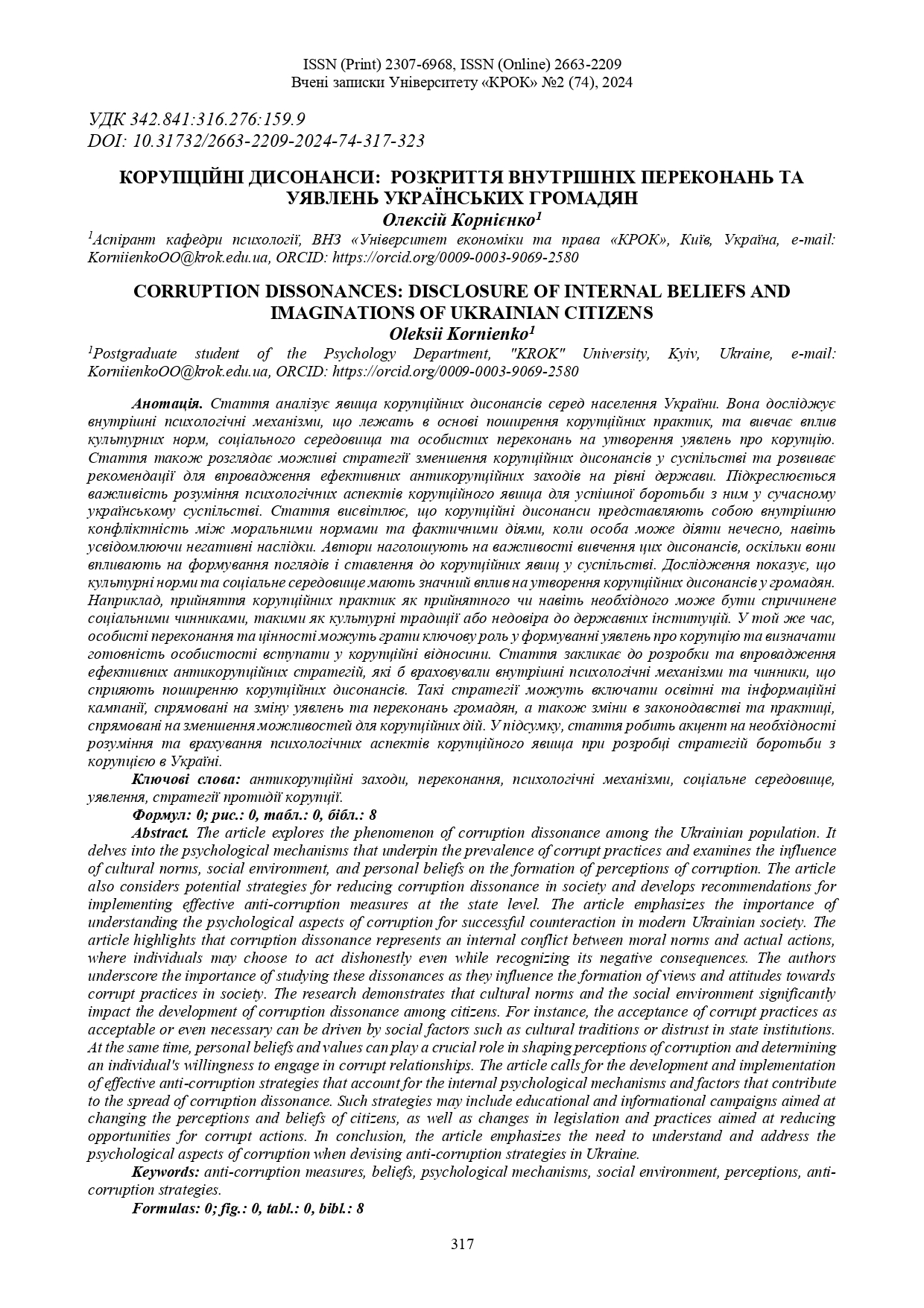CORRUPTION DISSONANCES: DISCLOSURE OF INTERNAL BELIEFS AND IMAGINATIONS OF UKRAINIAN CITIZENS
DOI:
https://doi.org/10.31732/2663-2209-2024-74-330-336Keywords:
anti-corruption measures, beliefs, psychological mechanisms, social environment, perceptions, anti-corruption strategiesAbstract
The article explores the phenomenon of corruption dissonance among the Ukrainian population. It delves into the psychological mechanisms that underpin the prevalence of corrupt practices and examines the influence of cultural norms, social environment, and personal beliefs on the formation of perceptions of corruption. The article also considers potential strategies for reducing corruption dissonance in society and develops recommendations for implementing effective anti-corruption measures at the state level. The article emphasizes the importance of understanding the psychological aspects of corruption for successful counteraction in modern Ukrainian society. The article highlights that corruption dissonance represents an internal conflict between moral norms and actual actions, where individuals may choose to act dishonestly even while recognizing its negative consequences. The authors underscore the importance of studying these dissonances as they influence the formation of views and attitudes towards corrupt practices in society. The research demonstrates that cultural norms and the social environment significantly impact the development of corruption dissonance among citizens. For instance, the acceptance of corrupt practices as acceptable or even necessary can be driven by social factors such as cultural traditions or distrust in state institutions. At the same time, personal beliefs and values can play a crucial role in shaping perceptions of corruption and determining an individual's willingness to engage in corrupt relationships. The article calls for the development and implementation of effective anti-corruption strategies that account for the internal psychological mechanisms and factors that contribute to the spread of corruption dissonance. Such strategies may include educational and informational campaigns aimed at changing the perceptions and beliefs of citizens, as well as changes in legislation and practices aimed at reducing opportunities for corrupt actions. In conclusion, the article emphasizes the need to understand and address the psychological aspects of corruption when devising anti-corruption strategies in Ukraine.
Downloads
References
Андрушко, П. (2010) Корупційні правопорушення та корупційні злочини як їх різновид: співвідношення і диференціація відповідальності за їх вчинення. Право України. 9. 90–91
Вознюк, А.А. (2019) Психологічні теорії пояснення корупції. Юридична психологія. № 2(25). 7-15. URL: https://doi.org/10.33270/03192502.7
Гуменюк, Л.Й. (2009) Психологічні регулятори поведінки корупціоногенної особистості в системі органів внутрішніх справ України. Науковий вісник Львівського державного університету внутрішніх справ. Серія психологічна. Випуск 2.131-143. URL: https://dspace.lvduvs.edu.ua/handle/1234567890/1396
Добродумов, П. О. (2008) Корупційні відносини: теоретико-методологічний аналіз. Правовий вісник Української академії банківської справи. № 1 (1). 31–35
Кікалішвілі, М.В. (2023) Соціально-психологічні фактори корупції. Електронне наукове видання «Аналітично-порівняльне правознавство». 2023. 324-329. URL: https://doi.org/10.24144/2788-6018.2023.04.54
Кувакін, С. В. (2021) Адміністративні корупційні правопорушення: поняття, сутність та особливості. Проблеми сучасних трансформацій. Серія: право, публічне управління та адміністрування. № 1. 9–14. URL: https://doi.org/10.54929/pmtl-issue1-2021-02
Топчій, В. В., Задерейко, С. Ю. (2023) Характеристика особи, що вчиняє корупційні кримінальні правопорушення. Ірпінський юридичний часопис. № 1(8). 183–191. URL: https://doi.org/10.33244/2617-4154-1(8)-2022-183-191
Чхаідзе, А.О. (2019) Психологія корупції. Соціокультурні та психологічні виміри становлення особистості : зб. наук. праць за матер. ІІ Міжнар. наук.-практ. конф. URL: http://ekhsuir.kspu.edu/handle/123456789/9324

Downloads
Published
How to Cite
Issue
Section
License

This work is licensed under a Creative Commons Attribution-NonCommercial 4.0 International License.

